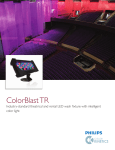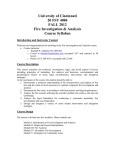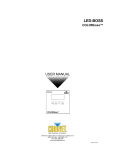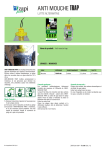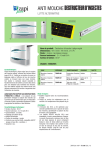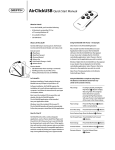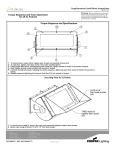Download PDS-750-TR™ Touring Power Supply Operator`s
Transcript
PDS-750-TR™ Touring Power Supply Operator’s Manual Rev 1.2 © 2004 City Theatrical, Inc. Patent Pending 2 CONTENTS The City Theatrical PDS-750-TR..............................................................................................3 Cautions...................................................................................................................................3 Compliance Certifications ........................................................................................................3 Compatibility with Color Kinetics Equipment ............................................................................3 Color Kinetics Fixtures Supported ........................................................................................3 Front Panel Controls ................................................................................................................4 Back Panel Features................................................................................................................5 Mains Power Requirements .....................................................................................................5 Connecting Color Kinetics fixtures to the PDS-750-TR.............................................................5 Operating Modes: CB, Pass Thru, or Stand-Alone ..................................................................6 CB Mode ..............................................................................................................................6 Pass Thru Mode ...................................................................................................................6 Stand-Alone Effects Mode ....................................................................................................7 Using the Mini-Zapi ................................................................................................................10 Installing the PDS-750-TR .....................................................................................................10 Software Options ...................................................................................................................11 Specifications.........................................................................................................................12 FIGURES Figure 1, PDS-750-TR, Front Panel .........................................................................................4 Figure 2, PDS-750-TR, Back Panel..........................................................................................5 Figure 3 PDS-750-TR with C-Clamps ....................................................................................10 3 The City Theatrical PDS-750-TR Thank you for using the City Theatrical PDS-750-TR™. Every effort has been made to anticipate your questions in this manual, but if you have any questions that we don’t answer here, or you want to discuss a special application, please feel free to contact us directly at City Theatrical. The CTI PDS-750-TR is a portable power supply unit provided with DMX 512 / Color Kinetics® data management circuitry. It is designed to provide 24VDC power and standard DMX512 distribution connections with DMX field addressing capability for Color Kinetics Fixtures, including ColorBlast® 6, ColorBlast 12, and iColor Cove® (other CK fixtures are also supported, check with your favorite lighting shop or City Theatrical for details). Cautions The PDS-750-TR is intended for use only by qualified professionals. Connection, installation and hanging of this equipment must be performed in accordance with all pertinent local, regional and national safety codes and regulations. The PDS-750-TR is intended for indoor use only. Keep the unit dry! Do not operate the unit if it gets wet! Do not operate in excessive heat/direct sunlight. Be sure installation provides adequate ventilation. Both the front and the back side of the unit must be clear of obstruction and allow free airflow. There are no user-serviceable parts inside! Refer to qualified service personnel! Compliance Certifications ETL Listed, Conforms to UL 508A cETL Listed, Certified to Can/CSA Standard 22.2 14-95 Compatibility with Color Kinetics Equipment The CTI PDS-750-TR is produced under license and with the cooperation and approval of Color Kinetics Inc. and is the only such entertainment power supply and control system approved for such use. City Theatrical, Inc. and Color Kinetics, Inc. have made every effort to assure that the CTI PDS-750-TR is fully compatible and will operate reliably with Color Kinetics CB and iColor Cove fixtures. Color Kinetics Fixtures Supported The PDS-750-TR will power and control the following Color Kinetics Fixtures: • ColorBlast 12: 12 units, 1 per output • ColorBlast 6: 24 units, 2 per output • ColorBurst 6: 24 units, 2 per output • ColorBurst 4: 48 units, 4 per output • Colorsplash 2: 24 units, 2 per output • iColor Cove: 96 units, 8 per output 4 PDS-750 TR Figure 1, PDS-750-TR, Front Panel Front Panel Controls The PDS-750-TR front panel controls will generally look familiar to most professional users, with a Pilot/Status Light, 3 BCD DMX Address Switch array, and a system reset switch. In addition, the unit is provided with a Configuration BCD, overload indicators, and a Mini-Zapi™ Switch. All the control functions are described below: 1. Pilot / Status Light: On = Power Present, System running Blinking = No DMX Solid = DMX Present Green = CB Mode Orange = Pass Thru Mode Alternating Red/Green = Stand Alone Mode 2. Reset Switch: Press to reset the PDS-750-TR’s system microprocessor 3. DMX Address Switches: Left to right = 100’s, 10’s, 1’s Set address to 000 for Pass Thru mode Set address to any valid address 001 – 4761 for CB mode 4. Configuration Switch: Selects Stand-Alone Routines. Also may be used for special functions 5. Channel Overload Indicator: Lights if internal circuit breaker is tripped, indicating an overloaded output. If tripped, disconnect load and allow unit to cool (~ 2 minutes). Circuit 1 The unit may be addressed to start at any DMX value up to 512, however addresses above 476 will waste outputs, as DMX values will not exist for all outputs. 5 breaker will re-set. Note: If internal circuit breaker trips, something is wrong. Correct fault before using system! 6. Mini-Zapi™: Resets any connected Color Kinetics CB fixtures to Light 001 (DMX 001,002 & 003), preparing them for easy use with the CB Mode setting Figure 2, PDS-750-TR, Back Panel Back Panel Features 7. IEC Power Inlet, Connect Mains Power Cord here. 8. DMX INPUT, 5P XLR Male Panel Mount connector, auto-terminated 9. DMX OUTPUT, 5P XLR Female Panel Mount connector, a re-generated, optically isolated DMX output (the Unit switches to passive hard-wired pass-thru if power is lost) 10. Fixture Output # 1, 4P XLR Female, for connection of Color Kinetics fixtures 11. Fan, do not obstruct 12. Fuse (10A 3AG) Mains Power Requirements The PDS-750-TR is is compatible with 100-240 VAC, 50/60 Hz Mains Power. The unit is provided with a panel mount IEC Input connector for use with standard 100V – 240V cord sets. Connecting Color Kinetics fixtures to the PDS-750-TR The PDS-750-TR is provided with Female 4 pin XLR connectors for output connection to the CK fixtures. The connector pin out is as follows: 6 PIN # Pin 1 Pin 2 Pin 3 Pin 4 Signal +24VDC (n/c) Data DC Common CK Cable Wire Color Red White Black Color Kinetics CB fixtures are provided with a permanently connected 60ft/20m cable. As 60ft/20m is the maximum length specified by Color Kinetics, this length should not be extended. Color Kinetics manufactures an optional Data Amplifier/Repeater which may be inserted in the run if additional length is needed. Please contact City Theatrical or Color Kinetics for assistance and details. Operating Modes: CB, Pass Thru, or Stand-Alone The Unit can be configured for either DMX managed “CB” Mode, Pass Thru mode, or StandAlone Mode CB Mode In CB Mode, the system will route DMX (as CK Data protocol) to each output based on the selected DMX starting address. Each fixture is set as CK Light 1 (DMX 001, 002, 003). The PDS-750’s internal DMX Manager selectively routes DMX Data to each light output so that each light receives only the data packets that it is supposed to respond to. The effective DMX address of each fixture is a function of the starting address of the PDS-750, combined with the number of the output that fixture is connected to. With the DMX Address set to 001: Fixture 1 = DMX 1, 2 & 3, Fixture 2 = DMX 4, 5, & 6, etc. To put the unit into CB Mode, simply set the DMX Address switches to a desired address other than 000. The unit can be set to any valid DMX address, however please note that any starting address over 476 will disable some outputs. Configuration / system setup for CB (DMX managed) mode 1 2 3 4 5 Using the on-board Mini-Zapi (see, Using the Mini-Zapi page 10) or Color Kinetics Zapi™, pre-address all CB fixtures as DMX 001. Plug up to 12 of those CB fixtures into outputs 1 – 12 Connect the System to a DMX source via the DMX Input and connect power Set the system’s DMX Address to the desired starting address value AAA The 12 connected CB fixtures will respond as follows: CB Fixture # 1 = DMX address AAA, AAA+1, AAA+2 CB Fixture # 2 = DMX address AAA+3, AAA+4, AAA+5 CB Fixture # 3 = DMX address AAA+6, AAA+7, AAA+8, etc. Pass Thru Mode In Pass Thru mode, the system will convert all the DMX values to CK Data protocol, and send that CK Data (with 24V power) to all 12 outputs. This mode is useful when powering i-Color Cove fixtures which have local address switches for each light. The Pass Thru Mode can also be suitable for CB fixtures when using the CTI PDS-750-TR in a system requiring Zapi 7 addressing schemes, such as when being used in combination with other Color Kinetics™ power supplies like the PDS-150™ Pass Thru Mode is selected whenever the DMX Address switches are set to all 0s (000) and the Config Switch is set to 0 Stand-Alone Effects Mode In Stand-Alone Mode the PDS-750-TR will run various pre-programmed effects without need for a console. This is very useful for events like parties or trade shows, where a constantly running program is desired without the use of a console or show programming. The unit is placed into Stand-Alone Mode using the Config BCD switch. When the unit is in Stand-Alone mode, the DMX Address switches become Effect controls. Different Stand-Alone Effects are selected via different setting combinations of the DMX Address switches and the Config switch Configuration Switch Settings for different Stand-Alone Effects 0 No Stand-Alone function. The System will operate normally in Pass-Thru or CB Modes, depending on the DMX Address switch settings. 1 Fixed Color. The DMX address BCDs are used to adjust the red, green and blue components. DMX 100s controls the red (0 is off and 9 is full), DMX 10s controls green and DMX 1s controls blue. 2 Color Wash (forward). The color wash effect moves sequentially around the spectrum of colors (Red, Magenta, Blue, Cyan, Green, Yellow & White) repeating the same cycle over and over again at user definable speeds. The speeds are controlled by setting the DMX 10s & ones to 1 of 48 possible settings. The following lists their settings and approximate fade times. 0 1 2 3 4 5 6 7 8 9 10 11 12 13 14 15 16 17 18 .25 sec .3 sec .4 sec .6 sec 1.25 sec 2.55 sec 4 sec 5 sec 10 sec 15 sec 20 sec 25 sec 30 sec 35 sec 40 sec 45 sec 50 sec 1 min 1.2 min 8 19 20 21 22 23 24 25 26 27 28 29 30 31 32 33 34 35 36 37 38 39 40 41 42 43 44 45 46 1.3 min 1.5 min 1.6 min 2 min 2.3 min 2.6 min 3 min 3.5 min 4 min 4.5 min 5 min 5.5 min 6 min 6.5 min 7 min 8 min 9 min 10 min 12 min 15 min 20 min 25 min 30 min 40 min 50 min 1 hr 1.5 hr 2 hr 3 Color Wash (reverse).Same as above but in counter clockwise rotation (White, Yellow, Green, Cyan, Blue, Magenta, & Red). 4 Cross-Fade. The Cross-Fade effect changes from one preset color to another than back again. The DMX 100s switch sets the starting color and the DMX 10s switch sets the ending color. The user specified speed is controlled by the DMX 1s switch. The following speeds are provided. 0 1 2 3 4 5 6 7 5 5 sec 10 sec 30 sec 1 min 2 min 15 min 30 min 1 hr The random color effect produces random colors at user definable speeds. The randomly generated color steps from one to the next without and fading. Speed is controlled by the DMX 10s and 1s digits. The following speeds are provided: 9 0 1 2 3 4 5 6 7 8 9 10 11 12 13 14 15 16 17 18 19 20 21 22 23 24 25 26 27 28 29 6 Fixed color strobe uses the DMX 100s switch to choose the color (1-Red, 2-Green, 3-Yellow, 4-Blue, 5-Magenta, 6-Cyan, 7-White, 8&9-Black). The strobe rate is controlled by the DMX 1s digit. The following rates are provided: 0 1 2 3 4 5 6 7 7 .075 sec .1 sec .15 sec .2 sec .275 sec .325 sec .375 sec .5 sec .625 sec .95 sec 1.25 sec 1.5 sec 1.875 sec 2.5 sec 3.125 sec 4.375 sec 5.625 sec 6.25 sec 9.375 sec 12.5 sec 15 sec 18.75 sec 31.25 sec 37.5 sec 56.25 sec 1.25 min 1.875 min 2.5 min 3.125 min 3.75 min 20/sec 13/sec 10/sec 7.5/sec 5/sec 4/sec 3/sec 2/sec Variable color strobe steps from color to color (Red, Green, Yellow, Blue, Magenta, Cyan, & White) in a user definable time period at a strobe rate that is also user definable. The same strobe rate that is employed in the fixed color strobe is available via the DMX 1s digit. The step times between color changes are provided via the DMX 100s and 10s switches. The values and time periods are the same as the random color effect. 10 Using the Mini-Zapi CB fixtures can be quickly re-addressed as “Light 1” (DMX 001, 002, & 003) using the Mini-Zapi. 1. Power Up the PDS-750-TR 2. Place the PDS-750-TR into Pass-Thru Mode 3. Connect the CB Fixture(s) to the PDS-750-TR. 4. Press the Mini-Zapi button. 5. The CB fixture(s) will light red for a moment and then flicker for a few seconds. 6. After the flickering stops, Power the system down. 7. Power the system back up to test the units. Installing the PDS-750-TR The PDS-750-TR can be mounted to a pipe or truss using standard theatrical C-clamps. The Unit is provided with ½” holes on each side of the case cover for attaching the C-clamps, and with a ⅛” hole in the left edge of the case cover for a safety cable. When mounting the PDS750-TR in this way, all necessary care should be taken to assure that the installation is suitable and safe, and that the hardware is properly rated for the task. Figure 3 PDS-750-TR with C-Clamps 11 Software Options In addition to the standard software provided with the PDS-750, CTI also offers additional software versions as standard options which can be installed in your system at the time of order without additional cost. Available standard options include: • Version 200a: This is the standard current version which most PDS-750s are provided with. Features are the normal features documented in this manual. • Version 1.04: This is an expanded patch version which allows separate control of multiple CB fixtures per connection port. In this version, The Config BCD switch is used to select the number of DMX values sent to each port when the unit is placed in CB mode (DMX managed mode). Settings: Config BCD set to 0 = 3 DMX values per port (standard operation) Config BCD set to 6 = 6 DMX values per port allows 2 CB fixtures to be connected and run independently. One unit must be addressed as CK Light #1, the other addressed as CK Light # 2. Notes 1. For 2-fixture configurations, a Color Kinetics Zapi must be used to pre-address the second light, as the CTI min-zapi™ will only address units as CK Light # 1. 2. Stand Alone features are not available with Ver. 1.04 software • Version 1.04a: This is a "low noise" version that is otherwise identical in operation to 1.04. With version 1.04a, the PDS-750 only outputs level changes to the fixture ports. Since the CB fixtures hold the last the valid level data level sent until they receive a change, the operation of the units is effectively the same as if the DMX data is constantly resent. Since this version only sends changes, the total amount of activity on the data Ports is much lower, particularly with channels that are left off, as there is no data sent, not even 0s. This software was developed to address the issues resulting from installations with cable runs that exceed the maximum limit recommended by Color Kinetics. Notes 1. Since the data is only output when changes occur, a light that is connected after a level change will not respond to that change. 2. As with version 1.04, Stand Alone features are not available with Ver. 1.04a software. Like all of City Theatrical's microprocessor based products, CTI can also develop custom software; contact us any time to discuss your unique requirements 12 Specifications Dimensions: 18.50” x 5.218” x 8.50” Weight: 13.5 Lbs. Electrical Specifications: • Input Power 100-240VAC 50/60 Hz 600 Watts • Output Power 24VDC 20Amps Max Features: • Heavy Duty NEMA 1 Steel and Aluminum enclosure • 100-240 VAC 50/60hz Mains Power (auto-ranging) • Mounting points for C-Clamps & Safety Cable • (12) 4P XLRF CK Data/24V Power output connectors for fixture connection • DMX 512 Interface (see below) • 1 x 750 Watt internal power supply • 24VDC 3A current limited per circuit output with LED Fault Indication • One-touch Mini-Zapi feature for reconfiguring fixtures with correct starting DMX Address • Includes 7 types of user-configurable fade and chase routines for stand-alone operation • In Stand-Alone Mode, selected routine is output to DMX Pass-Thru for synchronized Stand-Alone operation of many CB Supply systems DMX 512 Interface: • DMX Input via 5P XLR Male • Isolated and repeated DMX Pass-Thru via 5P XLR Female • DMX Address interface utilizing 3 Rotary BCD Switches for DMX Address configuration CK Output Configuration • • • 12 outputs providing Color Kinetics control protocol, +24VDC, and Ground “CB Mode”: DMX converted to CK protocol and output selectively to each port as per BCD address setting (see below) “iCove Mode”: All 512 DMX values converted to CK Protocol and output on all ports Options: • • Rack mount Pipe Mount • • Terminal Block Output ETL/cETL Version • • 4P XLR Output CE Version *Fixtures Supported: ColorBlast 12, ColorBlast 6, ColorBurst 6®, ColorBurst 4®, iColor Cove®















